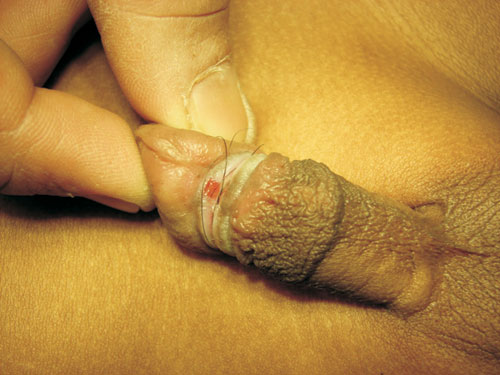|
|
|
Indian Pediatr 2011;48: 150 |
 |
Hair Coil Strangulation of the Penis |
|
Anindya Chattopadhyay
Assistant Professor, Department of Pediatric Surgery, Dr
BC Roy Memorial Hospital for Children,
111, Narkeldanga Main Road, Kolkata 700 026, West Bengal, India.
Email: [email protected]
|
|
A five-year old boy presented with symptoms
of itching and pain in the phallus, especially at night, for the last 3
months. The caregivers had noticed a progressively developing scab located
just proximal to the glans. The child had been seen by several
practitioners who gave local antibiotic ointments. Since the last two
weeks, the child had been passing urine partly from the affected area. On
examination, there was no penile edema or discharge, and only a fibrotic
groove proximal to the glans with a scab. Once the scab was elevated, hair
coil strangulation of the penis with the offending hair could be seen (Fig.
1). There was also a partial disruption of the urethra.
 |
|
Fig. 1 Hair coil injury with partial
transaction of the urethra. |
Hair coil strangulation or penile tourniquet injury is
a rare and potentially devastating condition that has been reported mainly
in circumcised children. The hair is thought to belong to the patient, and
a majority of cases are believed to be accidental although in select
cases, child abuse should be suspected. Hair is extremely thin, has high
tensile strength and is easily overlooked especially in the presence of a
foreign body reaction. Moreover, hair stretches when wet and shortens when
dried, which makes it an efficient tourniquet. Both superficial, and more
commonly, deeper injuries such as transection of the urethra and partial
or complete amputation of the glans has been reported, necessitating
repair of varying degrees of complexity. Awareness of the condition, with
early detection and removal of the offending coil of hair can prevent
these complications.
|
|
|
 |
|

